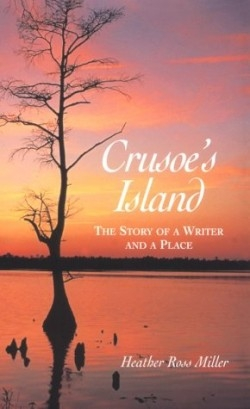Crusoe's Island
The Story of a Writer and a Place
When Clyde Miller asked Heather Ross to marry him in 1960, he also asked her if she would be able to live with him in the secluded woods of one of North Carolina’s state parks. Miller was a park ranger who went where the job took him. Ross said yes to both and in December 1961, they and their one-year-old daughter Melissa moved into their home in Singletary Lake State Park in the southeastern part of the state, an hour inland from the Atlantic Ocean. “Clyde and I were in the middle of the woods, poor and educated, stoic and sensitive, full of great ideas” Ross Miller, the young wife and mother, is a keen observer of places and people—so in between raising her family (son Kirk came along three years later) and carving a home in the 649-acre park, she began writing novels. Her first, The Edge of the Woods, is suggested by the family’s own life and secluded location.
Although the park is deep in the heart of North Carolina, the author calls it Crusoe’s Island, in reference to the character in DeFoe’s novel: “I thought… about being marooned, being all alone in the middle of nothing, a sea of trees, a desert of pine needles and sand and Spanish moss. This both tantalized and worried me.” She writes of their nearest neighbors, Ivory McCoy and his regal wife Loretta, whose ancestors seemed to have always lived on the place; the various park visitors (human and animal); the common day-to-day adventures of her family who lived fifty miles from the nearest town; and the ritual late-night talks with her husband.
For thirteen years the family lived there, until there was talk of closing the place. Clyde transferred and his family ended up living in the couple’s hometown. Singletary Lake Park didn’t close, but the family never lived there again.
Ross Miller—currently teaching creative writing and literature at Washington and Lee University in Lexington, Virginia—didn’t write about her remembrances of their time at Singletary Lake until ten years ago. That was when Clyde, diagnosed with cancer, lay dying. “Do you remember?” she asked him. He patted her hand, and said, “You tell me. Tell me again.” That’s how Crusoe’s Island came to be. Clyde helped edit. “It was a good moment. We traded memories. We stored them against the future.”
Reviewed by
Robin Farrell Edmunds
Disclosure: This article is not an endorsement, but a review. The publisher of this book provided free copies of the book to have their book reviewed by a professional reviewer. No fee was paid by the publisher for this review. Foreword Reviews only recommends books that we love. Foreword Magazine, Inc. is disclosing this in accordance with the Federal Trade Commission’s 16 CFR, Part 255.

